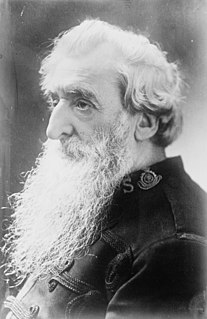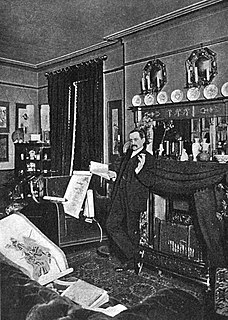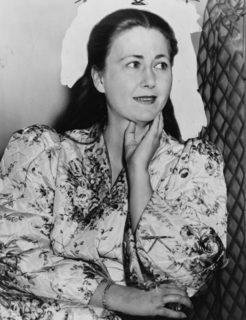A Quote by Loren Eiseley
A man who has once looked with the archaeological eye will never see quite normally. He will be wounded by what other men call trifles. It is possible to refine the sense of time until an old shoe in the bunch grass or a pile of nineteenth century beer bottles in an abandoned mining town tolls in one's head like a hall clock.
Related Quotes
Given that the nineteenth century was the century of Socialism, of Liberalism, and of Democracy, it does not necessarily follow that the twentieth century must also be a century of Socialism, Liberalism and Democracy: political doctrines pass, but humanity remains, and it may rather be expected that this will be a century of authority ... a century of Fascism. For if the nineteenth century was a century of individualism it may be expected that this will be the century of collectivism and hence the century of the State.
We have to recognise, that the gin-palace, like many other evils, although as poisonous, is still a natural outgrowth of our social conditions. The tap-room in many cases is the poor man's only parlour. Many a man takes to beer, not from the love of beer, but from a natural craving for the light, warmth, company, and comfort which is thrown in along with the beer, and which he cannot get excepting by buying beer. Reformers will never get rid of the drink shop until they can outbid it in the subsidiary attractions which it offers to its customers.
It is possible that in the 21st Century the Earth will not be inhabited by humans. One of the great mystics of India, a very simple man up in the mountains, somebody once asked him about the future. He said there will come a time when you'll walk five miles and you may see a light and you'll be so happy to know another being exists.
The Musketaquid, or Grass-ground River, though probably as old as the Nile or Euphrates, did not begin to have a place in civilized history until the fame of its grassy meadows and fish attracted settlers out of England in 1635, when it received the other but kindred name of CONCORD from the first plantation on its banks, which appears to have commenced in a spirit of peace and harmony. It will be Grass-ground River as long as grass grows and water runs here; it will be Concord River only while men lead peacable lives on its banks.
When you go to war as a boy you have a great illusion of immortality. Other people get killed; not you. . . . Then when you are badly wounded the first time you lose that illusion and you know it can happen to you. After being severely wounded two weeks before my nineteenth birthday I had a bad time until I figured out that nothing could happen to me that had not happened to all men before me. Whatever I had to do men had always done. If they had done it then I could do it too and the best thing was not to worry about it.
Out in the Pool certain other boats caught the eye... each carried a bright fire amidships, in a brazier, beside a man, two small barrels of beer, and a very large handbell. The men were purlmen, Grandfather Nat told me, selling hot beer in the cold mornings - to the men on the colliers, or on any other craft thereabout.
We never really see time. We see only clocks. If you say this object moves, what you really mean is that this object is here when the hand of your clock is here, and so on. We say we measure time with clocks, but we see only the hands of the clocks, not time itself. And the hands of a clock are a physical variable like any other. So in a sense we cheat because what we really observe are physical variables as a function of other physical variables, but we represent that as if everything is evolving in time.
THE NINETEENTH CENTURY SPREAD OF CHRISTIANITY WAS DUE PRIMARILY TO A NEW BURST OF RELIGIOUS LIFE EMANATING FROM THE CHRISTIAN IMPULSE. . . . NEVER IN ANY CORRESPONDING LENGTH OF TIME HAD THE CHRISTIAN IMPULSE GIVEN RISE TO SO MANY NEW MOVEMENTS. NEVER HAD IT HAD QUITE SO GREAT AN EFFECT UPON WESTERN EUROPEAN PEOPLES. IT WAS FROM THIS ABOUNDING VIGOR THAT THERE ISSUED THE MISSIONARY ENTERPRISE WHICH DURING THE NINETEENTH CENTURY SO AUGMENTED THE NUMERICAL STRENGTH AND THE INFLUENCE OF CHRISTIANITY.
Men will work hard for money. They will work harder for other men. But men will work hardest of all when they are dedicated to a cause. Until willingness overflows obligation, men fight as conscripts rather than following the flag as patriots. Duty is never worthily performed until it is performed by one who would gladly do more if only he could.
What is a great man who has made his mark upon history? Every time, if we think far enough, he is a man who has looked through the confusion of the moment and has seen the moral issue involved; he is a man who has refused to have his sense of justice distorted; he has listened to his conscience until conscience becomes a trumpet call to like-minded men, so that they gather about him, and together, with mutual purpose and mutual aid, they make a new period in history.




































